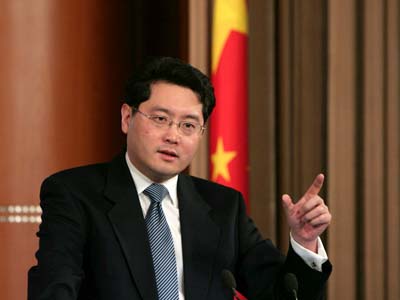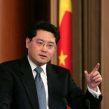
With Allies Like These, Who Needs Rivals?: China Maintains Studied Ambiguity on Ukraine as Russia Claims ‘Concordance of Views’
Publication: China Brief Volume: 14 Issue: 5
By:

In a statement that has been widely interpreted as signifying Chinese support for the Russian position on the ongoing crisis in Ukraine, the Russian Foreign Ministry announced on March 3 that the foreign ministers of the two countries had expressed “broadly coinciding views” in a telephone conversation (South China Morning Post (SCMP), March 4). While we do not know what Chinese Foreign Minister Wang Yi told his counterpart on the phone, China has studiously avoided endorsing Russia’s views in public, and rather appears to be pursuing a neutrality that will permit it to deal easily with any government that establishes power in Kiev. Nor has Chinese media coverage been favorable to Russia.
The Chinese Foreign Ministry’s terse official description of the call says only that “The two sides believed that properly handling the Ukrainian crisis is very important to safeguarding regional peace and stability”—a sentiment with which Washington and Kiev no doubt agree (Chinese Ministry of Foreign Affairs website (MoFA), March 3).
At the Foreign Ministry’s daily press briefings, Chinese spokespeople have repeatedly described the change in government as a legitimate choice made by the Ukrainian people. Two days after deposed Ukrainian President Victor Yanukovych fled Kiev, spokesperson Hua Chunying said that China “respects the independent choice made by the Ukrainian people in keeping with Ukraine’s national conditions and stands ready to foster strategic partnership with the Ukrainian side on an equal footing for win-win progress” (MoFA daily briefing, February 24).
The speed with which China came to accept the revolution in Ukraine stands in sharp contrast to its handling of the events of the Arab Spring, in which Chinese spokespeople repeatedly endorsed the legitimacy of regimes even as they were collapsing, leading to a situation in which China had to scramble to establish relations with new governments in order to protect oil concessions and other economic interests in these countries. There are several possible explanations for this change:
- Chinese leaders clearly remain deeply uncomfortable with democratic change, frequently expressing the fear that Western governments are trying to bring about a “Color Revolution” in China modeled on Ukraine’s 2004–2005 Orange Revolution, among others. However, they may have learned a tactical lesson from the Arab Spring.
- As many Chinese newspaper accounts have noted, China has strong interests in maintaining a relationship with any government in Kiev: Ukraine is a major supplier of grain to China, as well as military technology. Most famously, China’s prototype aircraft carrier, the Liaoning, is a refurbished ship purchased from Ukraine. Furthermore, Ukraine could serve as a vital transport link in China’s effort to build a “New Silk Road” across Central Asia to Europe.
- Finally, the circumstances are different. China’s opposition to the Arab Spring emerged during discussions of Western military intervention at the United Nations, where Security Council votes forced China to take a side. In contrast, the crisis in Ukraine has so far not raised the specter of pro-democratic military intervention.
While authoritative statements have not endorsed Russia’s position, they have offered minimal recognition of some of its views, and, despite questions from journalists at the daily briefing, spokespeople have declined to apply the principle of non-interference with a condemnation of Russian military activity in Crimea. On the whole, spokespeople have expressed impatience with these questions, directing journalists to a March 2 statement:
China is deeply concerned about the current situation in Ukraine. We condemn the recent extreme and violent acts there and have been urging the relevant parties in Ukraine to resolve their internal disputes peacefully within the legal framework so as to safeguard the lawful rights and interests of all ethnic communities in Ukraine and restore normal social order at an early date.
It is China’s long-standing position not to interfere in others’ internal affairs. We respect the independence, sovereignty and territorial integrity of Ukraine. There are reasons for why the situation in Ukraine is what it is today. China will follow the development of the situation closely and call on relevant parties to seek a political resolution of their differences through dialogue and negotiation based on respect for international law and norms governing international relations in order to uphold regional peace and stability (MoFA press briefing, March 2).
In response to a March 4 question about whether Russian actions violated the non-interference principle, spokesperson Qin Gang also made what appears to be a veiled accusation that Western meddling lay behind the recent collapse of Yanukovych’s government:
We uphold the principle of non-interference in others’ internal affairs and respect international law and widely recognized norms governing international relations. Meanwhile we take into account the historical facts and realistic complexity of the Ukrainian issue. You may also analyze why the situation in Ukraine is what it is today based on activities and behaviors of relevant parties in the past months (MoFA press briefing, March 4).
On March 4, Chinese President Xi Jinping spoke directly with Russian President Vladimir Putin about the situation. According to Chinese accounts, both leaders stressed the quality of their relationship, and exchanged views on the crisis. Reports of Xi’s views accord with the general ambiguity of other official statements—he said that the crisis, “among elements of chance, had elements of inevitability,” and expressed confidence that Russia could work with the international community to resolve tensions and achieve a political settlement (Xinhua, March 5).
Looking at “market” media coverage, the Chinese propaganda system appears to be tolerating a range of interpretations of the crisis. The reliably hawkish Global Times has expressed pleasure at seeing Russia “stand up to the intervention of the West,” and published a poll claiming to show that 46 percent of the Chinese public supports Russia’s intervention in Crimea (March 5). Meanwhile, more popular online outlets have relied mostly on “he-said, she-said” style reporting, repeating accounts of the Russian invasion of Crimea alongside Russian denials, and on predictions of war—one of the most widely-reprinted headlines was “Russia Sends Troops to Ukraine; Is War Inevitable?” (Beijing News, March 2).
Finally, more official ideological media have mostly relied on variations of a “pox on both their houses” interpretive line, describing the crisis in the Ukraine as a cautionary tale about the evils of great power politics. Most articles on the crisis that have been reprinted on the websites of core ideological journals Seeking Truth and People’s Daily have blamed both Western and Russian meddling for causing the crisis, describing it, in the words of a commentary written by a Europe specialist at the Chinese Academy of Social Sciences, as “the result of a game between Russia and the West” which has “tormented” Ukraine (Seeking Truth (Qiushi) online, reprinted from Global Times, March 5). Largely directed at an internal audience, these publications appear to be using the crisis largely as a chance to hold forth on the evils of Cold War-style alliance politics, using it as a foil to stress the importance of China’s declared distaste for alliances and Xi Jinping’s model of “a new type of international relations.”





